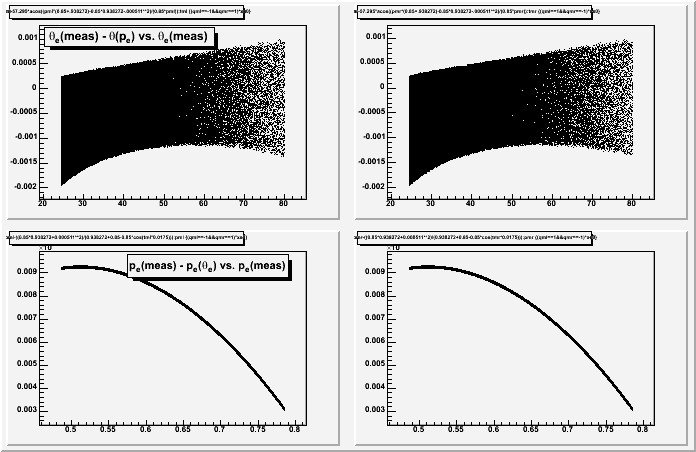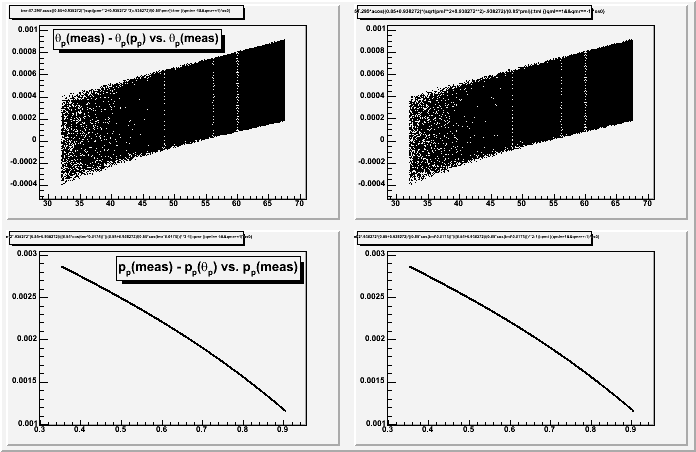Hello BLASTer's,
Please correct any of my assumptions or arguments as I am
not an experienced MonteCarlo Generator and the directions
I have received are sparse and unclear, most likely due to
my inability to have a face-to-face conversation with a
shared computer.
Thesis:
----------
Our kinematic corrections have been motivated by idealized
assertions of the direct ep-elastic kinematic relations.
This is, most likely, a false description and thus I am
investigating the generation of ep-elastic events in the
Monte Carlo. Hopefully this will allow me to more
realistically describe the benchmark for appropriate
kinematic corrections that will applied to subsequent data
Disclaimers and Assumptions:
--------------------------------------------
#1: I have used "unradiated MC" without resolutions
inserted. I believe that the questions and arguments
concluded from my results below still stand regardless
of whether I use the unradiated or radiated ep-elastic
generator with or without resolutions inserted. My
arguments for these beliefs are as follows:
a) Inserting resolutions merely smears the output of
Monte Carlo. It does not shift the peak. Using
the proper functions to analyze the Monte Carlo
output, any problems will be much more readily
apparent before inserted resolutions.
b) "Radiated" MonteCarlo affects the electrons and
only less than 40% of the time. The affected
electrons will have less energy and thus create a
tail. Again, the "radiated" tail will not shift
the peak. When I plotted the "UNradiated" Monte
Carlo output in a histogram describing the elec's
momentum vs. theta, I got a line. When I plotted
the "Radiated" MC output on top of this, I got the
SAME line with some (~20%) scattered points
beneath the UNradiated curve.
c) According to Aaron:
http://blast.lns.mit.edu/BlastTalk/archive/5211.html
a monte carlo model of momentum lost by protons
and deuterons had been analyzed. I, yet, am still
waiting to here if this is finalized and actually
in the present MonteCarlo for ep-elastic. My
guess, after looking at the results here, is that
if it is included, it is in dgen for the deuteron
reactions.
d) A hypothesis that I make based on my observations
of the MonteCarlo data is that the ep generator
generates the electron's kinematics based on the
ep-elastic cross-section and then, from the
electron's kinematics, calculates the expected
proton's kinematics. I don't find any indication
that each particle is unique, nor that they are
reconstructed separately. I would love for
someone to describe to me what happens in the
reconstruction when I invoke the '-m' flag for
lrn.
e) KINE and other Flags in fort.99:
KINE 10 1. 1. 0. 45. 0. 21. 0. 11.
ANNI 0
BREM 0
COMP 0
DCAY 0
DRAY 0
HADR 1
LABS 0
LOSS 1
MULS 1
MUNU 0
PAIR 0
PFIS 0
PHOT 0
RAYL 0
STRA 0
SYNC 0
Results from plotting ep-elastic kinematic relations
-----------------------------------------------------
1: There are negligible differences in both the electron's
theta and momenta relations, e.g.
[ theta_e(meas) - theta_e(p_e) vs. theta_e(meas) ]
and the analogous proton's theta and momenta relations.
They are included as Electrons.gif and Protons.gif. The
fact that there are two identical histograms shows no
sector dependence. Momentum differences in this
"measured - calculated" amount to almost 1 MeV in the
electron (note: the y-axis in this plot is multiplied by 10^-1)
and 3 MeV in the Proton. Theta differences in
proton reach up to 1 thousandth while electron theta
differences show 2 thousandths. Negligible.
2. Beam Energy reconstructed from particles is in
BeamEnergy.ps. Beam Energy calculated from the electron
and then in the second histogram from the proton show
values from 850.5 MeV to 853 MeV for the electron over
theta_e and from 850 to 856 MeV for the electron over
theta_p. For these, I do not understand how both of
these land above 850 MeV. If Proton Energy Loss is in
this Monte Carlo, how can I get values at or above 850
MeV for calculations from the proton?
Further Studies Currently Under Way
--------------------------------------------
1. Regenerating Radiated and Unradiated ep-elastic
MC files on the Buds rather than the ASU computer,
just in case I have an architectural difference that is
affecting the software. I had strange errors in the
config.sub file and the Makefile for DGen that aren't
present on the blast machines when I do a cvs checkout.
This may have affected the results, but I needed to
explore the ins and outs of the MC visually before I
started running batch jobs on the buds. The INFO
attached to the necessary files are informative but the
nuances still require a bit of experimentation and I'm
still not confident with the MonteCarlo... even though I'd
like to know who is.
If someone can give me guidance as to how I can
generate files with a different name than event.coda
and how I might be able to "lrn -m event.coda" to
different filenames than flr-0.root, lr-0.root and
dst-0.root, the process would go much much faster.
2. I will insert resolutions and recreate same analysis with
radiated MonteCarlo.
3. Anything else that is requested as a result of this email.
-eugene
-----------------------------------------------------------
Eugene Geis
PhD Student, Physics Department, ASU
Research Affiliate, MIT-Bates Laboratory of Nuclear Science
eugene.geis@asu.edu
-----------------------------------------------------------


This archive was generated by hypermail 2.1.2 : Mon Feb 24 2014 - 14:07:33 EST